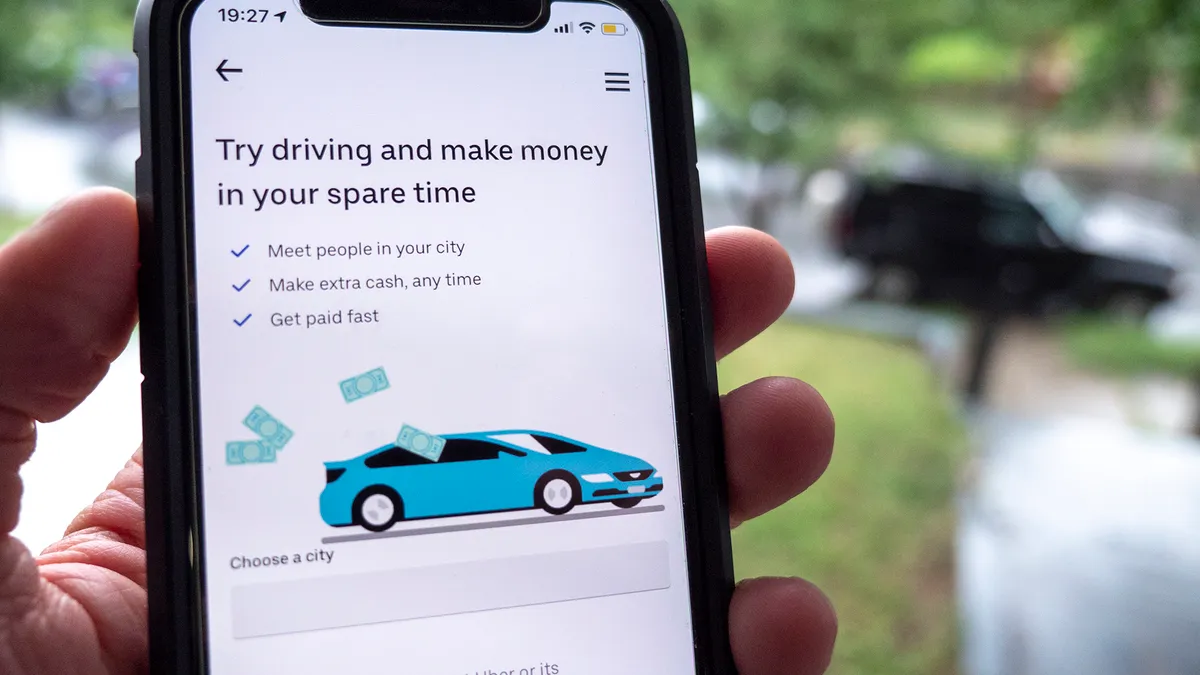UPDATE: Oct. 23, 2020: The state appeals court affirmed the lower court's ruling Oct. 22, concluding that Lyft and Uber must reclassify California drivers as employees. The emergency stay temporarily blocking lower court's order will expire 30 days "after issuance of the remittitur in this appeal," the appeals court said. The ruling puts added pressure on a state ballot measure, Proposition 22, which would classify app-based drivers as independent contractors unless certain criteria are met.
UPDATE: Aug. 20, 2020: A California appeals court granted an emergency stay Aug. 20, temporarily halting a lower court's order that would force Uber and Lyft to reclassify drivers in the state as employees. Lyft had threatened to cease operations in California at the end of the day but later said "rideshare operations can continue uninterrupted, for now."
Dive Brief:
- Uber and Lyft must reclassify their drivers in California as employees, a state judge said Aug. 10, issuing a temporary injunction (People of the State of California v. Uber Technologies, et al., No. CGC-20-584402 (Calif. Superior Ct., Aug. 10, 2020)). The order is stayed for 10 days and Uber told local media it will file an emergency appeal.
- The state had sued, alleging that the companies are in violation of AB-5, a law that took effect Jan. 1, 2020, and assumes workers are employees unless they meet strict criteria. Uber argued that it is exempt from the law, but the judge said that argument was undercut by its attempts to overturn the legislation and its support for a ballot initiative that would add an exemption.
- Finding that the state showed it was likely to prevail on its argument, the judge issued the injunction. The drivers obviously don’t perform work outside the companies’ "usual course" of business, as required by AB-5, the judge said, adding that "It is high time that they face up to their responsibilities to their workers and to the public."
Dive Insight:
AB-5 codified a state supreme court ruling that said an individual could be classified as an independent contractor only if the worker: a) is free from the control and direction of the hirer in connection with the performance of the work, both under the contract for the performance of such work and in fact; b) performs work that is outside the usual course of the hiring entity’s business; and c) is customarily engaged in an independently established trade, occupation or business of the same nature as the work performed for the hiring entity.
And as the judge’s Aug. 10 order noted, Uber and others have spent significant resources challenging the legislation in court and via ballot initiatives.
When it took effect with the new year, some employers made major changes to their workforces. Vox's SB Nation, for example, ended its contracts with California-based independent contractors. "That new law makes it impossible for us to continue with our current California team site structure because it restricts contractors from producing more than 35 written content 'submissions' per year," a company official said at the time. SB Nation said it would replace the contractors with full- or part-time employees.
In a statement provided to various media outlets an Uber spokesperson suggested that the Aug. 10 injunction, if allowed to stand, could lead it to shut down in California.














